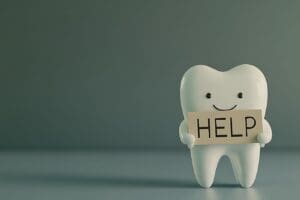Periodontal disease, or gum disease as its commonly referred to, is a bacterial infection of the gingivae and alveolar bone supporting the teeth. Although periodontal diseases occur in adults, it is commonly seen in people who have poor oral hygiene and poor dietary habits, which can lead to poor nutrition.
When discovered, gum disease can be reversed, but it will progress to the more serious types of periodontal disease when left untreated. It’s essential to be educated about these conditions and different types of periodontal disease to make the right decisions about your oral health. That’s why Northampton Dental Specialists Group has compiled a list of some of the most common gum diseases that plague thousands of people around the country.
1. Gingivitis
Of course, the most well-known form of gum disease is gingivitis, characterized by the initial onset of redness, swelling, and soreness of the gums. Gingivitis is caused by plaque buildup within the mouth, leading to gum irritation. Unfortunately, this is a widespread disease among adults, although it can also occur in children. If left untreated, gingivitis can lead to periodontal disease, which can eventually cause tooth loss over time.
2. Periodontitis
The other most common form of gum disease is periodontitis, which is more serious than gingivitis. Usually, periodontitis is caused by a variety of factors, including diabetes, genetics, smoking, and poor oral hygiene. This disease is characterized by red and swollen gums that are sore to the touch and often have an unpleasant odor. As the disease progresses, it becomes more and more difficult to treat and could also lead to receding gums, bone destruction, and tooth loss.
3. Aggressive Periodontal Disease
As its name implies, this form of gum disease is not only a form of periodontitis but one where the disease has progressed very quickly in a very short period of time. This form of the disease can occur in just three months, although it is much less common. It is characterized by a combination of severe redness and swelling of the gums, which may cause the gums to bleed after brushing. This disease is also characterized by rapid loss of bone tissue and rapid tooth loss.
4. Necrotizing Periodontitis
This form of gum disease is among the most severe since the disease can rapidly destroy both the gum tissue and bone tissue. Although the condition is quite rare, Necrotizing Periodontitis (NP) is very serious. This disease is characterized by bleeding gums where they have receded, causing the roots of the teeth to be exposed. Because of this, NP is characterized by severe pain and, in severe cases, complete loss of the teeth.
Necrotizing Periodontitis is caused by bacteria that rapidly destroy the tissue and bone that supports the teeth. This condition is more prevalent among people with HIV or those with immunosuppressant conditions, including chemo and radiation for cancer treatment. With the rapid onset of severe symptoms, the disease is much more difficult to treat and usually requires a hospital stay for treatment.
5. Systemic Periodontitis
It’s also possible to develop periodontal disease as a symptom of a more serious health condition. For example, people with heart disease, diabetes, and those with severe kidney disease have a greater risk of developing periodontal disease.
Systemic periodontitis is caused by an autoimmune response to an underlying disease, in this case, an infection of the heart or kidneys. Because of this, the immune system is compromised and cannot fight the infection in the mouth. This can lead to severe inflammation of the gums and tooth loss in the same way that non-systemic periodontitis does.
Conclusion
Gum disease is a common condition that is quite serious if left untreated. It’s important to have regular dental check-ups and professional cleanings, as well as keeping your teeth and gums as healthy as possible.
If you think you may be at risk for periodontal disease or you have questions about any of the symptoms associated with gum disease, it’s best to contact Northampton Dental Specialists Group to schedule an appointment. Our friendly and knowledgeable team is here to help, especially if you have a dental emergency that requires immediate attention from a specialist. Schedule an appointment today!





